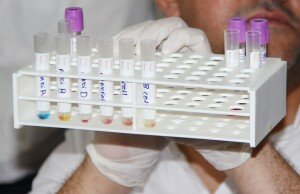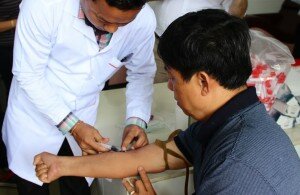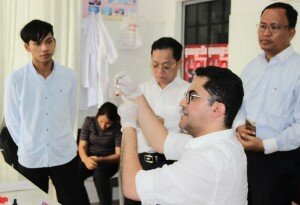
Blood grouping using standardized tube technique, Kampong Thom PRH blood bank, March 2018
24 April 2018
Blood transfusion and accurate laboratory results are lifesaving in many cases of complicated pregnancies. If done properly, blood transfusion and laboratory practices can help to decrease infant and maternal mortality rates. Bearing this in mind, the GIZ Improving Maternal and Newborn Care Project is addressing relevant blood transfusion and laboratory practices as an integral part of comprehensive maternal and child health.
A GIZ supported-evaluation done in October 2017 highlighted the need to invest immediately in building human capacities of lab and blood banks personnel to improve the knowledge and skills necessary to handle blood and blood components in a proper and standardized way. The report made the recommendation to more effectively bring together clinicians prescribing blood for patients and blood bank staff managing the blood distribution. This would have to include the harmonisation of medical knowledge about appropriate clinical use of blood in obstetric cases amongst clinicians and blood bank personnel.

Blood sample withdrawal for laboratory testing, Kampong Thom PRH blood bank, March 2018
In response, GIZ assigned an international expert to partner with the Cambodia National Blood Center to develop and implement a three-day training course, following the recommendations of the evaluation. Topics such as laboratory testing procedures, appropriate clinical use of blood, handling blood components and cold chain practices have been covered by the training course. Three training sessions were held in the provinces of Kampot, Kampong Speu and Kampong Thom, and a total of 41 health professionals attended the course, including obstetricians, maternity clinicians, pharmacists, laboratory technologists and technicians.

Interpretation of blood grouping test results, Kampong Thom PRH blood bank, March 2018
The training was a success and yielded very positive responses. Participants appreciated the newly gained knowledge as well as the dialogue basis which had been set between clinicians and blood bank and laboratory staff. Still, the training course is just a first step towards a more comprehensive intervention with follow-up and accompanying mentoring activities to ensure the sustainability and wider dissemination of knowledge and skills to improve maternal and child health through a better management of blood transfusion and laboratory practices.
Mohammed Farouk
aimer
Data Protection
Disclaimer
